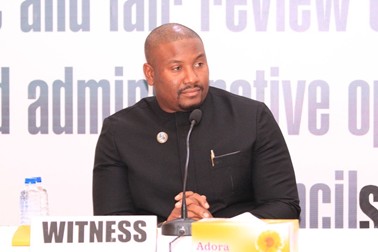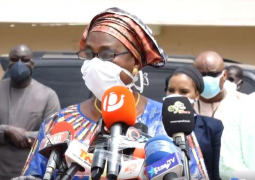
Bensouda, who has served as mayor since 2018, faced lead counsel Patrick Gomez on issues ranging from financial oversight, procurement irregularities, and audit queries to the interpretation of the Local Government Act and the financial manual that guides councils.
In his testimony, the mayor explained that the KMC has 19 councillors and seven committees, including finance, agriculture, and the local government accounts committee among others. He said there are six nominated councillors representing youth, women, transport, and persons with disabilities, with nominations partly coming from the Youth Council and the Federation of Different Abilities. Pressed on whether he nominated councillors directly, Bensouda said he nominated two but could not recall the rest.
When asked how many council accounts existed when he assumed office in 2018, Bensouda admitted he could not remember but promised to provide the information.
On whether there was an account specifically for revenue, he deferred responsibility to the CEO, stressing: “The CEO is the accounting officer. As mayor, it is not my mandate to know when monies are withdrawn. I only know through reports.” Lead counsel countered that the financial manual requires oversight from both the CEO and the mayor, but Bensouda maintained that the manual is only a guideline, not binding law, and that the Local Government Act takes precedence.
The issue of expenditure thresholds was also a source of contention. According to the manual, payments above D5,000 require higher approvals. Bensouda acknowledged that the council had passed a resolution requiring mayoral oversight for payments above D100,000, but some councillors argued it should be D500,000. The mayor insisted that the council has discretion to set thresholds under the Act, while the lead counsel rejected the view that council resolutions could override national regulations.
The mayor confirmed that the council only appointed lawyers in 2019, following the resignation of a previous one whose son had been appointed as mayor. Yassin Senghore was hired but the appointment was not subjected to the usual procurement procedures. He admitted that procurement at KMC has sometimes bypassed GPPA rules, especially for specialized services, but stressed that such matters are managed by the CEO and committees, not the mayor. He was questioned about several controversial procurements, including a hammer mill worth over D1 million, allegedly procured without due process. Bensouda claimed it was a donation.
He was also pressed on the Bakoteh Dumpsite fencing project, where payment vouchers showed over D5 million, though he said he recalled seeing D7 million. The Eco-Tech ballot project, which faced issues of missing data on daily collections, was also raised, but Bensouda said he would have to “find out why the data was unavailable.”
The commission cited multiple audit reports highlighting grave weaknesses.
These included fraudulent payments of D297,941 for rates in 2020, an outstanding balance of D121,000 from waste collection revenues, and unretired imprests of more than D1.2 million between 2018 and 2023. Auditors also noted over D253 million in unpaid residential and commercial rates, missing receipts for D186,650 in Government Treasury Receipts (GTR), and unprecedented GTR collections left unexplained.
Payments linked to Foday Joof, totaling D218,250 and reportedly exceeding D1.3 million, were questioned, but Bensouda said he would have to check whether the matter was resolved. Staff loans of over D4 million that were not deducted from salaries, and the non-maintenance of donation accounts in 2021 and 2022, particularly for COVID-19 relief funds were also raised.
Bensouda consistently argued that the CEO and finance committee bear direct responsibility for these issues but promised to provide supporting documents. The lead counsel pressed him on whether he was abdicating his supervisory role, but the mayor replied that there is “confusion” because he has no power to appoint or dismiss the CEO. “If you cannot appoint or dismiss the CEO, then you cannot supervise,” he said. He insisted that as a political head, he cannot at the same time serve as an accounting officer, citing the Local Government Act as his guiding authority. The lead counsel, however, argued that the financial manual was a regulatory instrument approved by the ministry and must be followed.
Bensouda also referenced a letter dated 17 September 2018, signed by all mayors and chairpersons, requesting amendments to the Local Government Act. Among their proposals were rationalizing the roles of mayors and chairpersons, granting councils greater authority over thresholds, and ensuring clerks of councils are supervised by mayors or chairpersons. He denied, however, that the letter specifically addressed financial thresholds, saying the issue was only implied through calls for role rationalization.
Read Other Articles In Headlines





